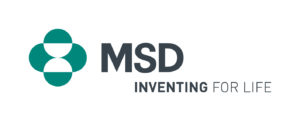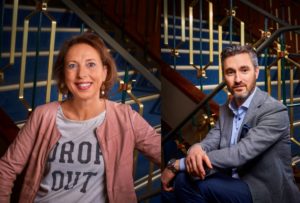MSD ready to act as VBHC accelerator
Birgit van den Berg, Associate Director Healthcare Innovation
Jurgen Huismans, Director Market Access
Over the last two years, MSD Netherlands has invested much effort in the area of Value-Based Health Care (VBHC). Quoting Birgit van den Berg (Associate Director Healthcare Innovation) and Jurgen Huismans (Director Market Access): “Recently, colleagues have gained knowledge by attending master classes and we are also partnering with the Decision Group. Within our Market Access Department, we now have two dedicated roles that fully focus on Healthcare Innovation. And we also develop and implement solutions and/or projects, striving for more patient value.”
“Recently, we initiated a project in partnership with the pharmaceutical company Roche and patient organization Longkanker [Lung Cancer] Nederland. We will be telling you more about this inspiring ‘patient journey’ project later in this article. But first, we would like to elaborate on who we are and why we think it is important to collaborate in VBHC projects.”
“MSD is the largest and most multifaceted pharmaceutical company in the Netherlands. For almost 100 years we have been developing, producing, packaging and distributing medicines and vaccines for humans and animals. Working as ‘One MSD’ – linking together all divisions, from pharmaceutical operations, to biotech, to office-based functions – approximately 5600 colleagues in Haarlem, Oss and Boxmeer serve patients locally and in more than 140 countries worldwide.”
Jurgen: “MSD Netherlands is the largest subsidiary outside the USA, and thanks to our three high-tech manufacturing facilities in this country, we have direct access to knowledge of innovative pharmaceutical processes and process improvement techniques. Also, the span of our activities, and therefore our network, is nationwide.” “And last but not least,” Birgit adds, “we have the scale and power and we are willing to invest time, resources and skills.”
Accelerator
Linking this to VBHC, Birgit and Jurgen firmly believe MSD can make an important contribution. “Particularly in multi-stakeholder value-driven projects, MSD has the potential to act as an accelerator, e.g., in leveraging our knowledge, expertise and network to develop value-adding solutions, provide ancillary services, co-initiate and disseminate VBHC blueprints.”
“On the road towards Value-Based Health Care, we currently focus on two areas: primary care and oncology. For MSD these choices make sense, both from a VBHC perspective and from a business point of view.”
Birgit: “Regarding primary care, MSD is one of biggest suppliers of vaccines worldwide, thereby contributing in the prevention of infectious diseases. Prevention is irrefutably the most optimal outcome from the patient’s perspective.” “And from the perspective of society and MSD,” says Jurgen. Additionally, MSD is at the forefront of developments in oncology.
Birgit: “Regarding primary care, MSD is one of the biggest suppliers of vaccines worldwide, thereby contributing in the prevention of infectious diseases. Prevention is irrefutably the most optimal outcome from the patient’s perspective.” “And from the perspective of society and MSD,”
Collaboration
Striving for optimized health outcomes for patients is the way to go, according to Birgit and Jurgen. “Therefore, we need to move away from the current system of being rewarded for volume and move in the direction of being rewarded for adding value and quality to people’s lives.”
In last year’s VBHC Thinkers Magazine – Prize Edition, the MSD perspective was described as follows: ‘We see it as our mission to help patients lead better and healthier lives, so they can spend more quality time with their loved ones and are able to participate in society as much and as long and as healthily as possible. But we don’t get there unless we collaborate.’
Jurgen: “We believe that all stakeholders, including companies such as ours, should work together and aim at truly new and innovative initiatives. Let’s not hold on to what we think we already do ‘in the spirit of VBHC’, but instead focus on changing processes and implementing projects at the level of those nominated for this year’s Prize. Quoting Fred van Eenennaam, ‘We should all be united in saying: how can we move the needle forward?’”
Mapping ‘the journey’ of patients with lung cancer
Directly related to the topic of collaboration is a partnership which started in 2018 and involved the patient association Longkanker Nederland and the pharmaceutical companies Roche and MSD. The partnership aimed at optimizing care for people diagnosed with lung cancer.
From our side, Birgit was part of this initiative. “We started off by asking ourselves: What are the patient experiences during all phases of a so-called ‘patient journey’? That is: from the first moment someone experiences symptoms, through diagnosis and treatment until the last step of the journey – death or survival? This can only be done by talking to patients, not about them.”
“For this project, 14 patients and 6 family members were interviewed by a market-research agency. By mapping their feedback into an integrated patient journey, we gained a much better insight into the significant gap between the ‘technical-medical world’ of healthcare professionals, and the ‘everyday-life world’ of patients and relatives. If we want to optimize healthcare for individual patients, these two worlds should ideally be aligned.”
Jurgen: “We believe that all stakeholders, including companies such as ours, should work together and aim at truly new and innovative initiatives. Let’s not hold on to what we think we already do ‘in the spirit of VBHC’, but instead, focus on changing processes and implementing projects at the level of those nominated for this year’s Prize”
Continuity, clarity, support
Birgit: “An important insight for us was that patients and family members need more continuity, clarity and support.”
“Continuity is about patients wanting to have an integrated care chain, i.e., a trusted point of contact, all along the way, also at moments when they are not being treated within the hospital. During that phase, caregivers in the hospital are temporarily out of the picture, but for patients the roller coaster continues, both psychologically and emotionally.”
“Clarity means better information for patients about the ‘hard facts’: what exactly does ‘stage 4 lung cancer’ mean and what are the prospects? What is, for example, a biomarker test and what’s the importance of it?”
“Support focuses on the ‘soft side’, the emotional and social impact of the disease: how do I deal with all these disruptive feelings, such as insecurity, upheaval, disbelief and fear? But also, attention for pro-active personalized care, in which preferences and values of each patient are being considered.”
“This insight shapes the field in which we can design and implement new VBHC projects. At this point we are validating the outcomes with caregivers: nurse-practitioners and physicians. With them we share our first ideas regarding potential solutions and/or improvement steps. Important to mention as well is the fact that we will also share the results with all other relevant pharmaceutical companies.”
Birgit: “An important insight for us was that patients and family members need more continuity, clarity and support.”
Time to act
“As mentioned earlier, MSD is convinced that VBHC can contribute to improved patient health outcomes, high-quality and affordable care, now and in the future, and beyond our innovative medicines,” says Jurgen. “We are enthusiastic about being part of the process of changing healthcare. By remaining open and transparent regarding our focus areas and our ambitions, we show our commitment to work together as reliable partners.”
In conclusion, Birgit and Jurgen say, “Let’s stop talking about each other’s role in VBHC, and start working with each other, to jointly improve patient health outcomes. By leveraging our combined potential and expertise we can secure both a healthy innovation climate and the best possible care path for each patient.”


